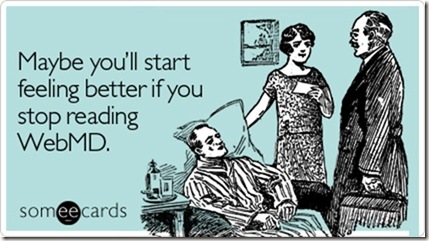
Wondering what that rash on your arm is? If the cough you’ve had for a few days warrants making an appointment to see your doctor/physician? If you’ve ever used the internet to answer these sort of questions then you’re in the 60-80% of internet users who regularly do so.
In theory this is a great idea – you get access to the collective knowledge of medicine, and you don’t get kicked out of the appointment room after 15 minutes.
However, there are a few problems – research tell us that:
- if you use a general search engine such as Google to search for non-specific symptoms, you will get a disproportionate amount of information on serious and rare medical explanations.
- 70% of those who initially search for common, innocuous symptoms progress to searching for information on rare, more serious conditions.
- there are significant problems with the quality, accuracy, and completeness of health websites, potentially exposing users to conflicting or confusing information.
- most users fail to check basic credentials (e.g. source validity and date of publication) and view online health information as reliable and of ‘good’ or ‘excellent’ quality.
Put all those together and you’ve got a potential problem. Now imagine if you’re someone with high levels of health anxiety. OK, wait a minute…
What is health anxiety?
Health anxiety is characterised by a preoccupation with either the fear of having, or belief that one already has a serious physical illness, in the absence of organic pathology (i.e. there is no physical problem). Those with high levels of health anxiety make catastrophic misinterpretations of benign bodily sensations and become fixated on their suspected illness, seeking repeated reassurance and medical consultations to investigate the perceived illness. However, their assumptions and expectations of medical consultations, combined with their misinterpretations of both test results (which show no evidence of illness) and the well-intentioned reassurance from medical staff, lead health anxious patients to enter a cycle of reassurance seeking and significant psychosocial distress.
In addition to the personal distress and impairment that health anxious individuals experience, they also place a significant burden on health services, utilising an estimated 41-78% more health care per year. Studies suggest that the lifetime prevalence rate of health anxiety is as high as 5%, with as many as 9% of patients in primary care meeting criteria, although diagnoses are rarely given, mostly due to issues of stigmatisation and/or patients’ presentations being better explained by a wider psychiatric disorder .
Woody Allen playing himself, a famous hypochondriac
“He wants me to do a brain scan to confirm what he already suspects!”
The study
Muse et al. (2012) were interested in examining different ways in which individuals with high levels of health anxiety sought health information online compared to those with low levels of health anxiety, the impact of seeking out this information, and their perceptions of the information.
They used the Short Health Anxiety Inventory (SHAI) to determine participants’ levels of health anxiety, and took the top and bottom quartiles of scores to represent high vs. low levels of health anxiety. To investigate internet use, they administered a new questionnaire which sought to examine:
- If participants used the internet to seek health information & reasons for not doing so
- The frequency and duration of any searching online for health information
- The effect of searching online on participants’ distress and health anxiety
- The type of health information sought and the sources used
- The perceived accuracy of online health information
The results
- A greater proportion of those with high levels of health anxiety sought health information online, with a significantly greater proportion of those with low levels of health anxiety saying they had ‘no need to look up health information’.
- Those with high levels of health anxiety sought health information online significantly more frequently than those with low levels, and this pattern was the same for duration of time spent searching
- Those with high levels of health anxiety rated the impact of searching for health information online as significantly more distressing and as having a significantly more negative impact on how anxious they felt about their health, compared to those with low levels.
- A significantly greater proportion of those with high levels of health anxiety reported searching for information on ‘information on diagnosed’ and ‘undiagnosed’ medical conditions and ‘looking for descriptions of other people’s experiences of illness’. As for the source of information, the only difference found was that a significantly greater proportion of those with high levels of health anxiety reported using message boards/support groups for health information.
- There was no difference in perceived accuracy of health information online, with both groups rating it to be moderately accurate.
In conclusion, to quote the abstract:
“This preliminary data suggests that searching for health information online may exacerbate health anxiety.”
So next time you’re wondering about a rash or that cough, maybe best not to start googling!
![]()
Muse, K., McManus, F., Leung, C., Meghreblian, B., & Williams, J. (2012). Cyberchondriasis: Fact or fiction? A preliminary examination of the relationship between health anxiety and searching for health information on the Internet Journal of Anxiety Disorders, 26 (1), 189-196 DOI: 10.1016/j.janxdis.2011.11.005

2 Responses to Cyberchondria: Online health information and health anxiety